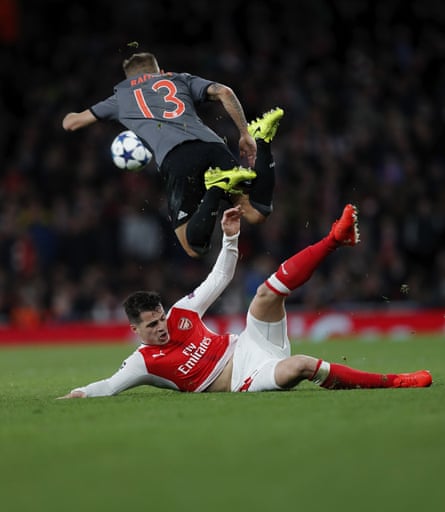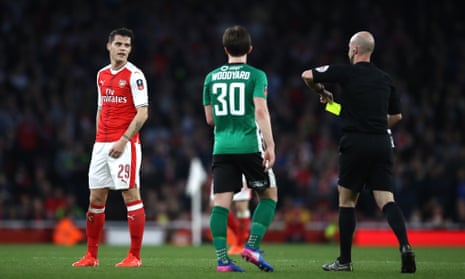It is rare to hear Arsène Wenger criticise one of his players in public but, on this occasion, the Arsenal manager could not help himself. Granit Xhaka had contrived to get himself sent off against Burnley in January for a two-footed tackle on Steven Defour and a comfortable-looking afternoon for his team would be overtaken by angst.
In the end, there was relief when Alexis Sánchez snatched a 2-1 victory with a 98th-minute penalty but it did not spare Xhaka. According to Wenger, the midfielder had “to control his game and not punish the team with a lack of control in his tackling”. The following week, Wenger returned to the theme. “I would encourage him not to tackle, and to stay on his feet,” he said. “You have to accept he can be punished for these kinds of tackles now. He has to learn from that.”
It was Xhaka’s second red card of the season for Arsenal and third in total, if his dismissal for Switzerland against Portugal in September was factored in. In a broader context, it was his ninth red card in less than three years, the previous ones having come at Borussia Mönchengladbach – from where he moved to Arsenal in a £35m deal last summer.
Xhaka’s first sending-off for his present employer came in October – for a chop on Swansea City’s Modou Barrow – and, in that context, the Burnley red card led to him being banned for four matches. Wenger could not have been clearer. Xhaka had to learn his lesson.
Since Xhaka returned from suspension in the middle of February, he has played in five matches. He has been booked in each. One was for dissent at Liverpool and another for a cynical pull on Sutton United’s Craig Eastmond. The other three were for crude tackles – on Bayern Munich’s Xabi Alonso and Rafinha and Lincoln City’s Matt Rhead. The message does not seem to have sunk in.
Wenger was more like his usual self when he discussed the Xhaka issue before Saturday’s visit to West Bromwich Albion. He described the Lincoln booking as “soft”, which had most of his audience scratching their heads, and he claimed Xhaka had become a marked man for referees; a victim of his reputation.

“I believe that he is now in a position where on the first foul, he gets a yellow card,” Wenger said. “For example, last Saturday [against Lincoln] – first foul, soft yellow card. So, he is a victim a little bit of his reputation. You see tackles of some players which are much worse than what he did [against Burnley] and they don’t even get a yellow card. He got a straight red and because he had a history of that in Germany, I think he is a bit of a victim of that.”
It was no great surprise to hear Wenger take this line but it felt as though he was on more commonly held ground when he went back to the subject of Xhaka’s tackling technique. Sometimes the 24-year-old can lunge in with scissor-style challenges and everybody is agreed that is never a good look.
“Does he have a problem with his technique? Yes. I agree,” Wenger said. “The way he tackles is not to hurt people. It is more the consequence of the fact he doesn’t master well the technique of tackling.
“He has improved a lot since he has arrived. Before, he was maybe a little bit looking too much to impress. But he still has work to do in the one-against-ones. Overall, he has to stay on his ground because it is tackling that can get him sent off. When he defends well, staying on his feet, he is a fair player.”
When Xhaka arrived at Arsenal, there was the misconception – probably based on his physique and disciplinary record – that he was a midfield enforcer. The reality is he is a No8, whose greatest strength is his range of passing. There can be no comparison, say, to Chelsea’s N’Golo Kanté.
“They are different types of player,” Wenger said. “Xhaka is more in the distribution of the pass through the lines and Kanté is more the ball winner with the real technique to steal the ball without making the foul. You compare more Kanté with [Francis] Coquelin than with Xhaka. Xhaka is more a distribution player.”
Nevertheless, Xhaka has to resolve his problems with winning the ball and he will be tested at West Bromwich Albion, in what could be a physical game. Wenger has struggled in away matches against Tony Pulis’s teams, winning only one of seven and losing four.
Wenger was asked about the make-up of his starting XI and one of his decisions will be whether to persist with a 4-3-3 formation – into which he suggested last Saturday that Mesut Özil struggled to fit. Özil began the Lincoln game on the bench but he came on when Alex Oxlade-Chamberlain was forced off with a hamstring injury. “Özil can play in a 4-3-3 – on the left – but when I play Özil behind the striker [in a 4-2-3-1], I have to be a bit more cautious with one of the two flanks,” Wenger said.
Caution must also be the watchword for Xhaka.

Comments (…)
Sign in or create your Guardian account to join the discussion